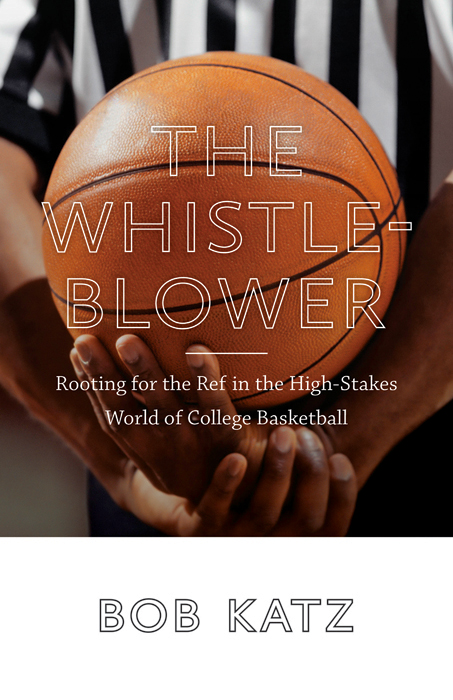Chicago Tribune Review
Review: ‘The Whistleblower’ by Bob Katz
Read the full review here (registration required).
Ed Sherman
9:50 am, February 26, 2015
March Madness means an annual descent into consuming massive amounts of college basketball. Even though the players might change, fans will be reunited with the familiar antics of long-time coaches and uniform colors of dominant programs such as Kentucky and Michigan State.
Within this swirl of activity and noise, there will be three people wearing black-and-white shirts patrolling the floor who will have a profound impact on the outcome. The same fans who will hurl expletives of rage in their direction in the arena probably wouldn’t recognize them if they were sitting at an adjoining table at a restaurant after a game.
Bob Katz tries to put faces on the officials in a new book, “The Whisteblower: Rooting for the Ref in the High-Stakes World of College Basketball.” He spent a year inside their world in an attempt to detail the challenges of their vital role in the game.
Early on, Katz sets the tone in writing about the referees’ code:
Referees approach each game with a very explicit goal in mind. They want to create conditions, through their officiating, that will enable the team that plays the best that day to have a fair chance to win. That elementary formulation is all they can realistically hope to accomplish, and it is a mission in which they take immense pride.
Katz frames his perspective mainly through the eyes of Ed Hightower. The referee, who retired in 2013, actually achieved somewhat of a celebrity status because of his longtime work calling Big Ten games. At the very least, fans recognized his name.
Hightower definitely is a compelling subject. He rose from poverty as a child to become the superintendent of schools in Edwardsville, Ill. A man of immense integrity, he understood that his day job and officiating have a common thread: a necessity to make tough, unpopular decisions.
“Somebody has to be in charge,” Hightower said. “It’s the same on the court. The basketball arena is a very, very partisan place. If fair and balanced is my goal, what are the chances of pleasing all 16,000 people?”
Another longtime official, J.D. Collins, explains the process as the referees being required to “absorb the chaos (and) create calm” within a game. Only a select few have the ability to wade into that caldron.
One of the most interesting chapters has Katz attending a summer camp for would-be officials. Veterans like Hightower were there, looking for the next crop to move up to the highest levels.
Katz notes the arbitrary nature of the selection process, calling it “alarmingly subjective.” He is even more struck by the referees’ inability to explain why one of the attendees isn’t considered a prime prospect.
Katz writes: “You just have it, they would say, as if that said anything at all.”
Yet perhaps the requisite skill does come down to having “it” when the final seconds are ticking off the clock. Katz writes about several occasions when Hightower has to make split-second calls that will determine the moods of thousands of people (good and bad) for the rest of the day.
To add additional context to those calls, Katz might have been better served to get the reaction from the coaches involved. It would have been interesting to learn their insights on the attributes they think are required for a good official.
Also, you could make the case that Katz could have widened his net beyond Hightower. Multiple perspectives might have formed a more complete portrait of the referees. The book is a quick read at just over 200 pages.
Yet Katz is a talented writer who provides a vivid account of a world not seen by college basketball fans. He shows the referees’ complete dedication to the art of working a game.
A telling passage involves Katz describing Hightower and his fellow officials watching a basketball game in a hotel restaurant shortly after they called a game.
Katz writes how they tracked the movements of the referees, not the players, and questioned some of the calls.
“Their eagerness to second-guess the ref’s decision was typical of any myopic fan,” Katz writes. “But the underlying nuances in their reasons for doing so were strictly a connoisseur’s.”
Indeed, fans likely still will boo the referees during March Madness. But they will do it from a different perspective if they read “The Whistleblower.”
Ed Sherman writes about sports media as a contributor to the Tribune and at his site, ShermanReport.com. His latest book is “Babe Ruth’s Called Shot: The Myth and Mystery Behind Baseball’s Greatest Home Run.”
